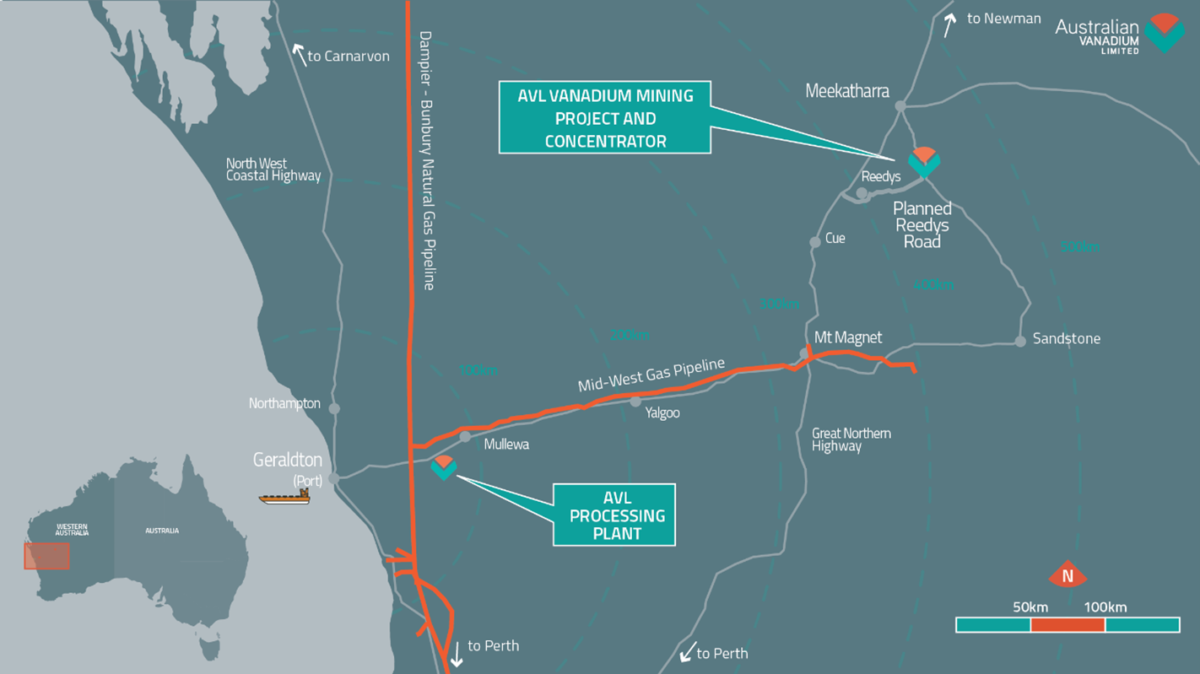Western Australian company Australian Vanadium Limited, or AVL, has said feasibility studies into its vanadium mine near Meekatharra in the state’s mid-west confirm the project as a “potential globally significant primary vanadium producer” targeting critical mineral, steel and energy storage markets.
The Australian Vanadium Project, as it’s called, has a pre-tax net present value of A$833 million (US$ 621.1 million) with an equity internal rate of return of over 20%, based on a vanadium pentoxide price of US$10.50/lb (equal to 0.45kg), the company said.
Managing Director Vincent Algar described the study’s findings “significant milestone” for AVL. “The company is now in a position to progress through funding, final engineering, procurement, construction and into production,” he said.
Last month, the federal government awarded the project a grant of $49 million to support its progression, part of a push to end Australia’s reliance on China and cement its place in the rapidly growing critical minerals markets for electric vehicles and batteries.
There are currently just a handful of vanadium mines operating in the world, with Australia home to some of the world’s biggest untapped deposits. To this end, Algar told pv magazine Australia last July that Western Australia could “easily dominate the battery supply chain for vanadium inside and outside Australia.”
The project’s technical studies have now been completed, including three years of extensive piloting test work, which the company says supports robust processing flowsheets.
Mining and manufacturing
The Australian Vanadium Project mine is the first in a two pronged approach from the company which will see it turn the mined product into commercial vanadium battery electrolyte within Western Australia.
The company is pursuing these two avenues, mining and manufacturing, as part of its vision of vertically integrate the business and “value add” – moving from Australia’s traditional role of simply extracting and exporting raw minerals to instead creating products from those materials onshore, which typically has far higher profit margins.
Popular content
Transported from the mine, the vanadium will be processed in Tenindewa, near Geraldton, closer to workforce as well as a port.
Australian Vanadium Project
The mine has an anticipated initial life of 25 years with the company saying its approvals are “well advanced.” The company confirmed its application with the Environmental Protection Agency had been successful lodged early last year, with its application for the Tenindewa processing plant concurrently being examined.
A financial investment decision is anticipated for the mining project by the fourth quarter of 2022, with construction to commence in the fourth quarter of 2023, dependent on approvals and financing.
Wood Australia, an engineering firm with experience in vanadium and similar mineral processing, has undertaken the engineering and design, providing an overall accuracy for the capital and operating cost estimates of ±15%, AVL said.
The company estimates the project payback period will be 7.3 years after the first production. Its total gross revenues before interest, taxes, depreciation and amortization (EBITDA) is $4.4 billion, according to AVL.
“The positive economic results of the study have occurred in an environment of global inflationary pressure, COVID-19 related impacts and geopolitical instability,” Algar said in the company’s statement. “We have attempted to accommodate potential areas of challenge by building them into our assumptions and remaining agile when efficiency opportunities present.”
“The award of the $49million grant provides further vindication of the importance and relevance of the Australian Vanadium Project and we acknowledge the responsibility placed upon us, as all Australians are now stakeholders in our work.”
This content is protected by copyright and may not be reused. If you want to cooperate with us and would like to reuse some of our content, please contact: editors@pv-magazine.com.



2 comments
By submitting this form you agree to pv magazine using your data for the purposes of publishing your comment.
Your personal data will only be disclosed or otherwise transmitted to third parties for the purposes of spam filtering or if this is necessary for technical maintenance of the website. Any other transfer to third parties will not take place unless this is justified on the basis of applicable data protection regulations or if pv magazine is legally obliged to do so.
You may revoke this consent at any time with effect for the future, in which case your personal data will be deleted immediately. Otherwise, your data will be deleted if pv magazine has processed your request or the purpose of data storage is fulfilled.
Further information on data privacy can be found in our Data Protection Policy.